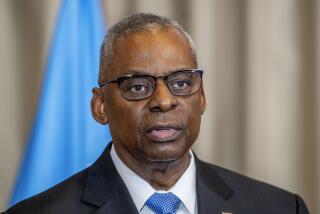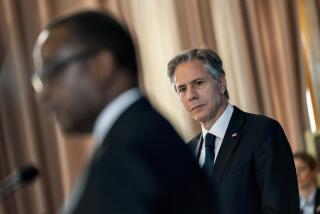U.S. Urged to Clarify Goals in U.N. Peacekeeping Operations
- Share via
WASHINGTON — As tensions continue to mount over the role of the U.S. military in regional conflicts, a panel of Pentagon officials and diplomats urged Wednesday that the United States more sharply define its goals in U.N.-run peacekeeping efforts and push for improvements in the multilateral operations.
Richard L. Armitage, a former assistant secretary of defense for international security and a Washington consultant, told a Senate Armed Services subcommittee that with each new deadly raid by U.N. peacekeepers in Somalia--many of whom are Americans--the objectives in the region are becoming increasingly confused.
“I think it’s quite fuzzy,” Armitage said. “I’m not sure we know what we’re doing now.”
Jonathan Dean, a former ambassador and arms control negotiator, said that even with the deployment this week of 300 U.S. soldiers to protect the borders of Macedonia, the multilateral effort in the Balkan region has been “a miserable one.”
“The U.S. itself has sporadically tried to exercise leadership on Yugoslavia,” Dean said. “But it has led from behind, refusing to commit even a limited ground force contingent for delivery of humanitarian supplies.”
The hearing before the subcommittee on coalition defense and reinforcing forces was designed to gather testimony on a Pentagon request for $300 million as part of its share of U.N. peacekeeping expenses.
The United Nations now operates 13 peacekeeping efforts worldwide, involving 60,000 soldiers from about 20 nations, at an annual cost of $2.8 billion. Although the troops are officially under U.N. direction, America has taken on an ever-increasing leadership role. Most of the equipment and weaponry is supplied by the United States, while U.S. expertise figures prominently in the planning and execution.
Sen. Dirk Kempthorne (R-Ida.), a subcommittee member, said the dangers rise every time the United States is pulled into another regional dispute.
“We find ourselves in a terrible dilemma,” he said. “The longer we remain in such dubious battles, the greater the risk that American lives may be lost.”
Furthermore, he said, there is the fear that when U.N. peacekeeping forces pull out of a region, the area can easily revert to chaos.
“We can’t always be a global cop trying to enforce a peace that does not exist,” he said.
Another danger, officials said Wednesday, is that enemy forces, such as Somali warlord Mohammed Farah Aidid’s supporters, will see American casualties as a prize.
“U.S. lives will be special to potential foes,” Armitage warned. “There are simply too many people with too many weapons and too many reasons to kill Americans.”
Frank G. Wisner, undersecretary of defense for policy, said the Pentagon has created a position of assistant secretary of defense for peacekeeping to monitor U.S. involvement abroad. He said various options also are under consideration for strengthening U.N. peacekeeping functions, such as improving communications and training programs.
Karl F. Inderfurth, a U.S. representative to the United Nations, said the Clinton Administration in February launched an inter-agency review of U.S. participation. He said the United States has taken the lead at the United Nations in pushing for peacekeeping reforms that spread the responsibility among more nations.
More to Read
Sign up for Essential California
The most important California stories and recommendations in your inbox every morning.
You may occasionally receive promotional content from the Los Angeles Times.














